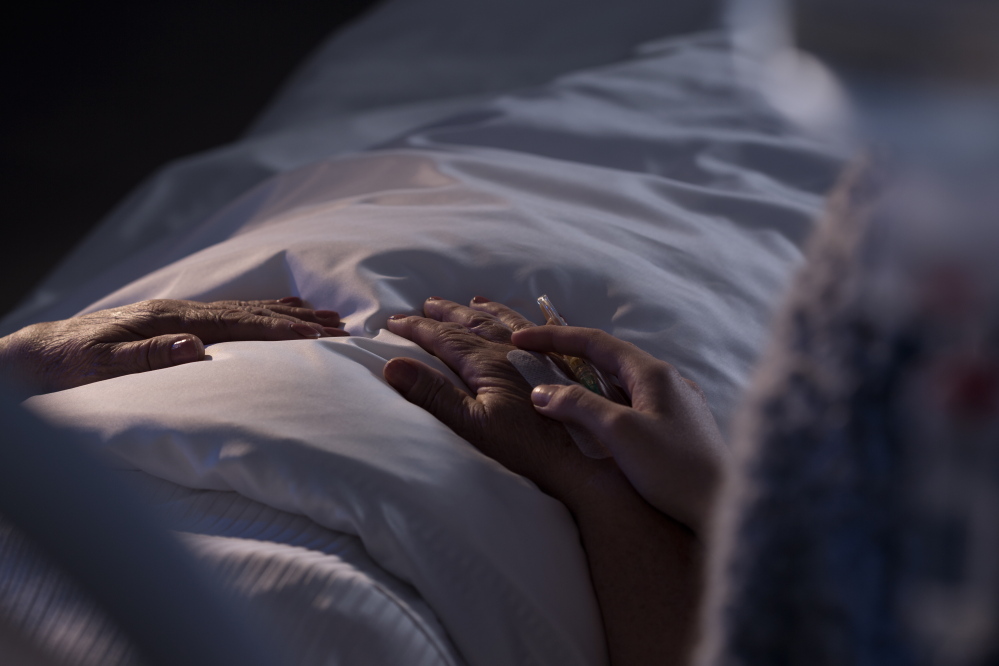Volunteers are gathering signatures right now to protect the end-of-life plans you make with family, friends and your doctor. If successful, the “Death with Dignity” measure would go on the statewide ballot next November.
Despite the fact that a strong majority of people from all faith traditions generally support such an initiative, the greatest opposition comes from institutional religion. But while some religions oppose the measure, characterizing it as a morally bankrupt practice, other religions believe allowing one to make their own end-of-life decisions honors the individual and a faith tradition of accepting everyone for who they are.
The United States Conference of Catholic Bishops statement on Death with Dignity reads, in part, that “Catholic teaching views suicide as a grave offense against love of self, one that also breaks the bonds of love and solidarity with family, friends, and God” (Catechism of the Catholic Church, no. 2281). The group believes that “effective palliative care also allows patients to devote their attention to the unfinished business of their lives, to arrive at a sense of peace with God, with loved ones, and with themselves.”
The statement also says the group believes “suffering accepted in love can bring us closer to the mystery of Christ’s sacrifice for the salvation of others” and ends with urging “Catholics to pray for (the terminally ill), trusting in God’s mercy” (CCC, no. 2282-3).
Unitarians, on the other hand, respect the inherent dignity of everyone’s life and believe that dignity “may be compromised when life is extended beyond the will or ability of a person to sustain that dignity.” Extending one’s life beyond endurance usually serves to satisfy cultural and religious norms and “may cause unnecessary suffering and/or loss of dignity while providing little or nothing of benefit to the individual.” While respecting the terminally ill person’s end-of-life decisions, Unitarian’s “advocate safeguards against abuses by those who would hasten death contrary to an individual’s desires.” Unitarians also “inform and petition legislators to support legislation that will create legal protection for the right to die with dignity, in accordance with one’s own choice.”
These religious views are polar opposites: the bishops’ view is based on an external standard, while the Unitarians’ view is based on an individual’s right to make their own decisions.
Since religious beliefs differ so widely and the First Amendment guarantees the separation of church and state, I believe making laws based on religion — laws everyone must follow regardless of their personal religious beliefs — violates the First Amendment.
Allowing one to make their own end-of-life decisions, however, supports our nation’s core values of individual freedom and self-determination.
Opponents claim that in states with Death with Dignity laws, the denial of expensive life-saving medication and approval of cheaper medication to end one’s life is rampant. The truth is that all established medications in every state are paid for regardless of cost, by individual and state-run health care plans, but expensive experimental drugs are not. Forcing insurance companies and states to pay for expensive experimental medication for a few people will necessarily result in either denying established treatment for hundreds of people or increasing private insurance premiums and raising taxes for public insurance programs.
Safeguards require patients choosing Death with Dignity be an adult, mentally competent, capable of self-administering the medication, and be diagnosed by two physicians to have less than six months to live. Patients must ask for the medication twice, 15 days apart and in person. Patients must also make a written request, witnessed in person by two people who state the patient is acting voluntarily. One of the witnesses cannot be a relative and cannot be in a position of gaining from the patient’s death. Additionally, patients must wait 48 hours to receive the prescription and may rescind their request at any time.
Research shows these safeguards protect patients as intended. Having a Death with Dignity law creates mutual respect and allows patients to talk openly about all end-of-life care options, from all perspectives, with friends, family and doctors. Research also shows when a terminally ill person has the means to end their life if suffering goes beyond endurance, they relax and start to enjoy the last remaining days they have with friends and family.
This initiative will allow the terminally ill to plan when to end their lives, give family and friends time to be present when their loved one dies and restore a measure of dignity to a tragic event.
Tom Waddell is president of the Maine Chapter of the Freedom from Religion Foundation. He can be reached at: president@ffrfmaine.org
Send questions/comments to the editors.



Success. Please wait for the page to reload. If the page does not reload within 5 seconds, please refresh the page.
Enter your email and password to access comments.
Hi, to comment on stories you must . This profile is in addition to your subscription and website login.
Already have a commenting profile? .
Invalid username/password.
Please check your email to confirm and complete your registration.
Only subscribers are eligible to post comments. Please subscribe or login first for digital access. Here’s why.
Use the form below to reset your password. When you've submitted your account email, we will send an email with a reset code.